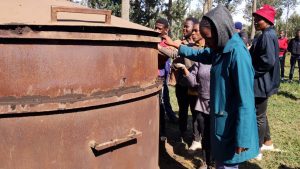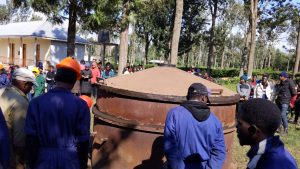Sustainable charcoal production is an important consideration to minimize the environmental impact of traditional charcoal production methods. The use of efficient and environmentally friendly technologies, such as the Mark V Portable Kiln, can help achieve this goal.
Sustainable charcoal production aims to reduce deforestation and carbon emissions while promoting responsible forestry practices. Here are some key principles and methods.




BSc. Forestry and BSc. WTVA , In FPT on Charcoal; Production by using Mark V Portable Kiln at SUATF
Using sustainable charcoal production methods and technology offers several advantages that benefit both the environment and society;
- Conservation of Forests: Sustainable charcoal production reduces reliance on traditional hardwood trees, which helps protect forests from deforestation and degradation. By utilizing renewable biomass sources or agricultural waste, sustainable methods minimize the impact on natural ecosystems and preserve biodiversity.
- Reduced Greenhouse Gas Emissions: Sustainable charcoal production methods often incorporate emission reduction strategies. By optimizing carbonization processes and capturing gases released during production, the amount of greenhouse gas emissions, such as carbon dioxide and methane, can be significantly reduced. This helps mitigate climate change and air pollution.
- Resource Efficiency: Sustainable charcoal production aims for efficient use of biomass resources. By maximizing the yield of charcoal from each unit of biomass, less waste is generated. Additionally, by utilizing waste products such as coconut shells or agricultural residues, valuable resources that would otherwise be discarded can be put to productive use.
- Energy Efficiency: Modern sustainable charcoal production methods focus on energy efficiency by employing improved kiln designs and heat recovery mechanisms. These advancements minimize energy consumption during the production process and reduce the overall environmental impact.
- Socioeconomic Benefits: Sustainable charcoal production can have positive socioeconomic effects. By promoting responsible practices, it creates employment opportunities and income for local communities, particularly in rural areas where charcoal production is prevalent. Additionally, sustainable methods can lead to long-term economic stability by ensuring the availability of biomass resources for future generations.
- Certification and Market Access: Adopting sustainable charcoal production practices can open doors to certification programs, such as Forest Stewardship Council (FSC) certification. These certifications provide credibility and assure consumers that the charcoal they purchase comes from responsibly managed sources. Access to certified markets can lead to higher prices and increased demand for sustainably produced charcoal.
- Health and Safety: Traditional charcoal production methods, such as open-air pit kilns, can pose health and safety risks due to the release of harmful smoke and gases. Sustainable methods, on the other hand, often employ improved kiln designs that reduce emissions and improve working conditions for producers, thereby safeguarding their health and well-being.In SUATF students were exposed on how to utilize wood waste for charcoal production and calculate on the recovery and efficiency of Mark V Portable Kiln.
In Sokoine University of Agriculture Training Forest (SUATF), students were exposed on the recovery rate, Performance and operational procedures of Mark V Portable Kiln in Sustainable utilization of charcoal. By embracing sustainable charcoal production, we can promote a more environmentally conscious and socially responsible approach to meet the demand for charcoal while preserving our natural resources for future generations.
The supervision was under Prof. F.B.S Makonda and Mr. G. Mangi from Department of Forest Engineering and Wood Sciences at Sokoine University of Agriculture.




